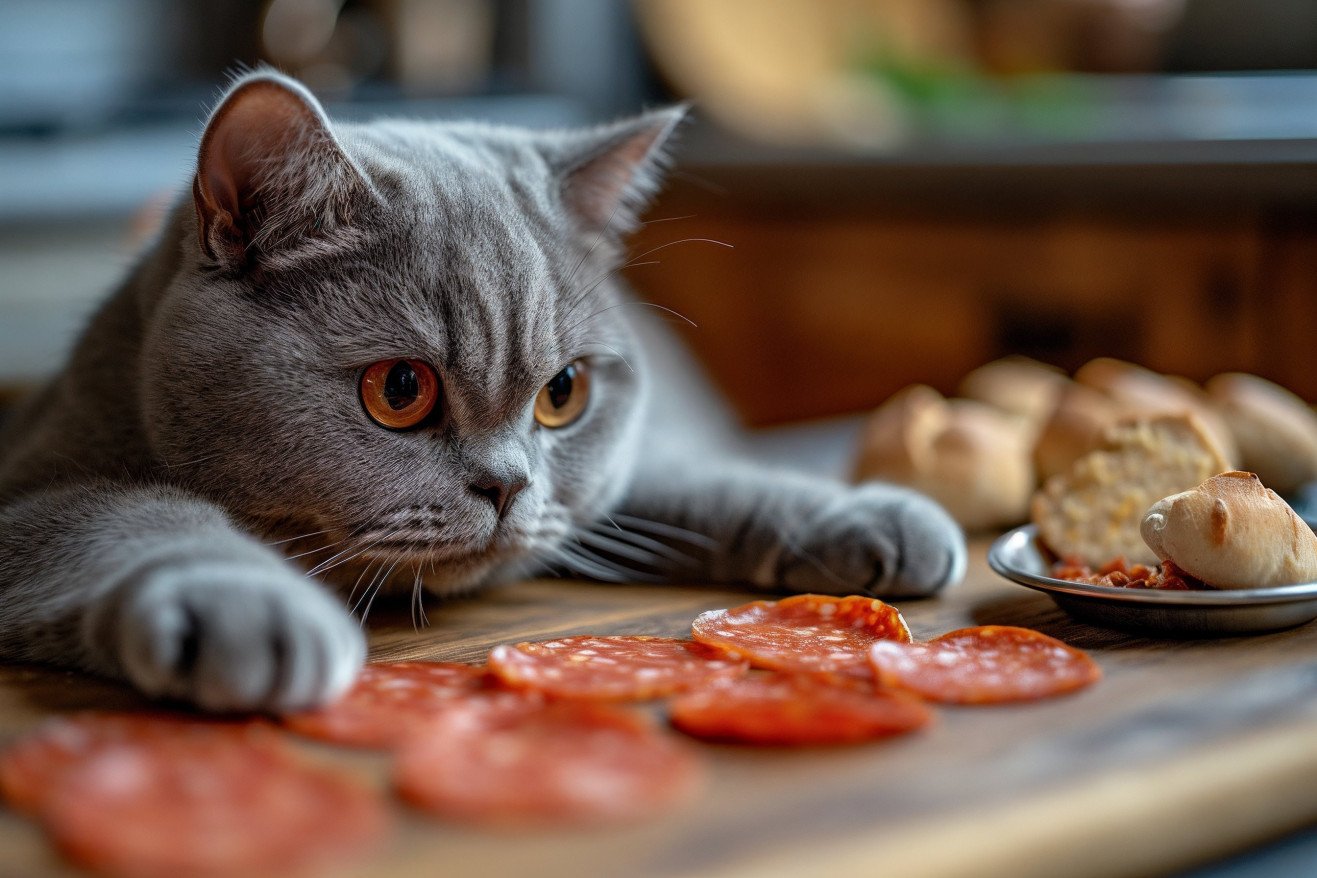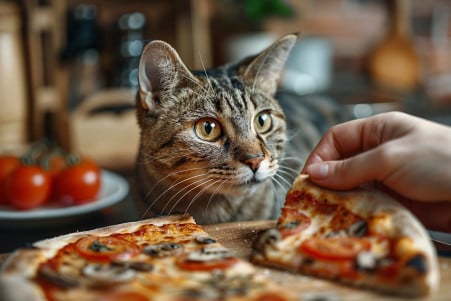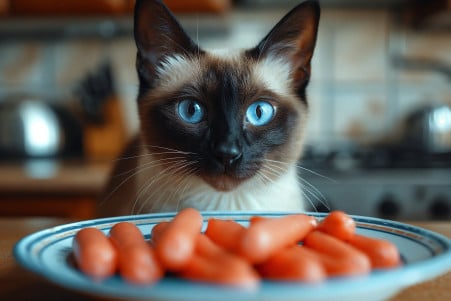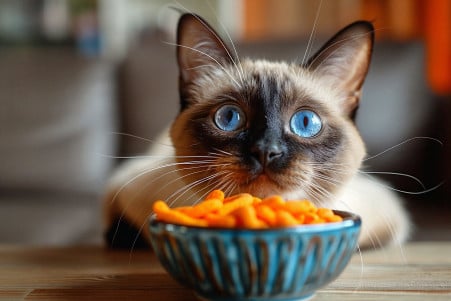Can Cats Eat Pepperoni? Understanding the Risks and Alternatives
1 February 2024

While pepperoni is a delicious snack for people, it’s not the best choice for your cat. This is because pepperoni is high in fat, salt, and spices, which can lead to obesity, sodium toxicity, and gastrointestinal problems in cats. If you want to give your cat a treat, stick to cooked lean meats or cat treats from the store.
This article will review the latest research in veterinary science and nutrition to help you better understand what cats need in their diet and the risks that human foods like pepperoni can pose to them.
We’ll also look at the metabolic differences between cats and humans and why some of the ingredients in pepperoni can be bad for your cat. By the time you’re done, you’ll be better equipped to make decisions about your cat’s nutrition and well-being.
Can cats eat pepperoni?
Feline Nutrition: A Carnivore’s Needs
Cats are obligate carnivores, meaning they need the nutrients found in animal flesh to survive and thrive. This has led to cats having different dietary requirements than other common pets, like dogs and even humans.
VCA Animal Hospitals notes that animal-based proteins are essential to a cat’s diet, and they provide the amino acids taurine and arginine. These amino acids are necessary for vision, reproduction, and heart health and are not found in plant-based proteins.
A diet high in fat and sodium, like pepperoni, can be very dangerous for cats. In addition to upsetting the balance of their diet, the ASPCA warns that it can also lead to obesity and sodium poisoning.
When choosing cat food, it’s important to make sure it’s complete and balanced, according to the Purina Institute. This means that the food contains all the nutrients a cat needs without the addition of supplements. To make sure your cat is getting the best nutrition possible, choose high-quality commercial cat foods that meet AAFCO standards and avoid feeding them human treats that could be dangerous.
Pepperoni Is Bad for Cats
While pepperoni is a tasty treat for humans, it contains a number of things that are bad for cats.
One of the biggest issues is that pepperoni contains sodium nitrate, a preservative that has been shown to have negative effects on cats.
A study published in PubMed reported on cases of cats that had developed methemoglobinemia, a condition that results in a decrease in the amount of oxygen in the blood, after consuming food that was high in nitrates.
In addition to the nitrates, the high fat and sodium content in pepperoni can be problematic for cats, leading to obesity and other health issues.
A study published in the Journal of Animal Research and Nutrition found that some of the wet cat food samples they tested had nitrite concentrations that exceeded the estimated safe upper limit, with the highest levels found in the beef formulations. This shows just how dangerous these preservatives can be.
In addition, the spices and other ingredients in pepperoni can cause toxic reactions in cats, which is another reason to avoid feeding it to your pet. Veterinarians have consistently warned against feeding cats processed meats like pepperoni, which is why it’s so important to stick to species-appropriate foods to keep your cat healthy.
Feline Metabolism: Why Cats Can’t Eat Human Food
One of the key ways in which cats are different from humans is in how they metabolize food, especially in terms of liver enzymes. A 2021 study by Smith et al. published in BMC Veterinary Research found that cats have a unique response to different diets, including high-carbohydrate diets, which caused increased insulin concentrations.
The researchers concluded that cats’ livers, which don’t have the same enzymes as human livers, can’t process high-carb foods, which makes human foods like pepperoni inappropriate for cats.
Moreover, a review in PMC of research on the pharmacokinetics of cats found that cats have unique pharmacokinetic properties, including an inability to metabolize drugs and foods through pathways like glucuronidation. This means that cats have a hard time with certain human foods, especially those that are high in fat and carbs. Because cats’ livers can’t metabolize these macronutrients effectively, it’s riskier to feed cats human foods that contain them.
This difference in metabolism is why it’s so important for cats to eat a species-appropriate diet. While humans can eat a wide range of foods, including processed meats like pepperoni, cats need to eat a diet that’s designed to meet their carnivorous nutritional needs. Cat owners need to understand these metabolic differences so they can keep their pets healthy and avoid human foods that can be toxic to cats.
Healthy and Delicious Snack Options for Your Cat
If you’re a cat owner who wants to make sure your pet stays healthy and safe, you’ll want to avoid giving them pepperoni. However, there are plenty of healthy alternatives to consider.
Unseasoned, lean meats like chicken or turkey are great choices because they offer the high protein content that cats require. Make sure to cook these meats thoroughly and avoid adding any oils or seasonings to make sure they don’t become contaminated with bacteria and are easy for your cat to digest.
For those who prefer to purchase pre-made treats, there are plenty of commercial cat treats that are specifically designed to meet the dietary needs of cats. When shopping for these treats, make sure to find options that offer a mix of delicious flavors and a well-balanced diet and are free from unnecessary additives. Some good options include Feline Greenies Smartbites or Vital Essentials Vital Cat Freeze-Dried Cat Treats.
If you’re interested in making your own cat treats, there are plenty of simple recipes that you can use to make healthy options that meet your cat’s dietary needs. No matter what, make sure to introduce any new treats into your cat’s diet slowly and in moderation.
And always talk to your vet before you make any changes to your cat’s diet to make sure that you’re getting advice that’s tailored to your cat’s specific health requirements. By choosing the right treats, you can spoil your cat without putting their health at risk.
Human Foods That Are Dangerous to Cats
Not all treats are created equal, and that’s especially true for our cats. It’s important to note that there are many human foods that can be toxic to cats. For example, According to ASPCA Pet Insurance, raw fish, onions, garlic, and caffeinated products are all toxic to cats.
Raw fish can lead to thiamine deficiency, which can cause a loss of appetite and seizures in cats. Meanwhile, onions and garlic can cause a breakdown of a cat’s red blood cells, which can lead to anemia.
The symptoms of food-related toxicosis in cats can range from gastrointestinal distress to more serious issues like kidney failure, according to WebMD. If your cat is showing any signs of distress, including vomiting, lethargy, or disorientation, it’s important to get them to a vet right away.
To avoid your cat accidentally eating something they shouldn’t, make sure to keep toxic foods out of their reach and avoid giving them table scraps. Hill’s Pet Nutrition suggests keeping food in secure locations and feeding your cat a diet that’s specifically formulated for them to avoid accidental poisonings.
In case of emergencies, places like the ASPCA Animal Poison Control Center can be a great help. That said, it’s always best to stick to foods that are made specifically for cats when in doubt to make sure that you’re keeping them safe and healthy.
Final Thoughts on Cat Nutrition
As we’ve discussed throughout this article, cats have very specific nutritional requirements that need to be met in order for them to be healthy and happy. Cats are obligate carnivores, which means they need a diet that is high in animal-based proteins, and they also need to get certain nutrients from their food, such as taurine and arginine.
It’s been shown that human foods, especially those that are high in fat and sodium like pepperoni, can cause a range of health problems from obesity and digestive issues to more serious conditions like sodium nitrate toxicity.
It’s important to make sure that you’re feeding your cat a diet that meets their natural needs. This means being discerning about the treats you give them and making sure that any treats you give them are contributing to their nutritional needs. If you’re in doubt, you can always go with a commercial cat treat that’s been formulated to meet a cat’s nutritional needs or ask your vet for guidance.
It’s important to remember that being a good cat owner includes being responsible about your cat’s nutrition. By learning about the metabolic differences between cats and humans and the dangers of feeding cats human food, you can make sure that you’re making choices that will support your pet’s health and well-being.
Working with a vet to make sure that your cat’s diet is tailored to their specific needs will give you the confidence that you’re doing everything you can to support your cat’s nutritional health.


